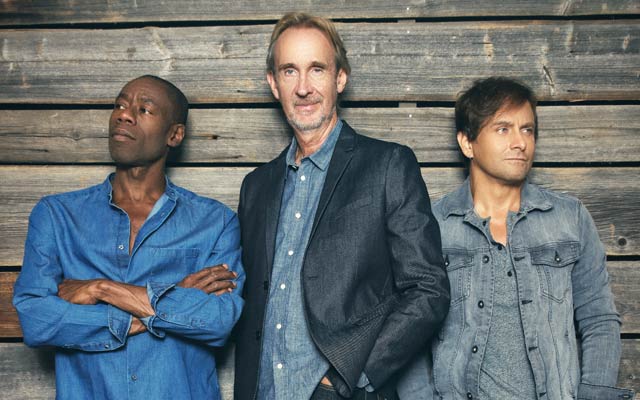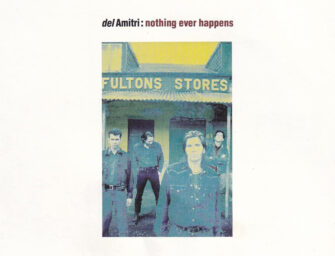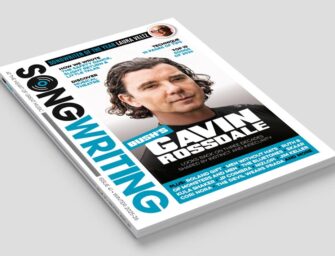
Mike + The Mechanics: “Basically I’m a songwriter who plays guitar well enough to pull it off on stage”
The main man behind Mike + The Mechanics and co-founding member of Genesis talks about his successful collaborative songwriting process
English musician Mike Rutherford was the co-founding and one of the longest-standing members of the rock band Genesis, and went on to form the highly successful supergroup Mike + The Mechanics. The latter became a chart-topping act and earned him an Ivor Novello Award for the 1988 single The Living Years.
Mike was one of the main Genesis songwriters throughout their career and wrote the lyrics for some of the band’s biggest international hits, such as Follow You Follow Me, Turn It On Again, Land Of Confusion and Throwing It All Away. He was inducted into the Rock and Roll Hall of Fame as a member of Genesis in 2010.
As he prepared to release the Mechanics’ eighth album Let Me Fly, we caught up with Mike to understand his particular role as a songwriter, discover why he’s B.A. Robertson’s ‘word-o-meter’ and find out which member of Genesis is brilliant at writing endings…
Take us back to the ‘genesis’ of Mike & The Mechanics.
“Going back to that time, we did the first Mechanics’ album – that had five singles –just to try and see really… I was surprised how well it did. It was big in America first of all. I hadn’t necessarily planned it – I always do something, see how it goes and then see what I want to do next. That’s worked for the last 40 to 45 years and I’m still doing that really! Big plans aren’t great. So what was quite nice was the first album was very much about who was going to sing, what were we going to do, just experimental. For the second album, I had Chris Neil and B.A. Robertson, my two co-writers – Paul Carrack wasn’t writing with us then; he was singing. In a way, we started off in a nicer place because we knew who we were, we had one album under our belts and we knew what worked in terms of the writing teams. I always write at home in the music room – it’s not really a studio, although it is now more of a studio but it’s still a sort of home. I have a big studio down the road that Genesis owned, but to write there is the wrong sort of pressure: you feel under pressure to be great! Whereas at home it feels more relaxed. So B.A. and I got together…”
How did you and B.A. meet?
“We wanted to do some other stuff alongside Genesis, so I said, ‘I’m going to try some other writing partnerships’. I’d been given 10 people to work with and the first two were B.A. and Chris, and I didn’t go any further. In the end, it kind of worked. I do remember meeting Chris Neil for lunch, who was a producer rather than a co-writer. I’d done a Mechanics album and that had been a hit, I’d done a Genesis album, I’d done a Mechanics tour in America, and I just thought, ‘This is too much,’ and so I said to Chris, ‘I can’t do another solo album with the Mechanics, I’m going to give it a break.’ Chris said nothing and obviously he was disappointed, but after three months I’d had a holiday and a bit of time, and I wanted to do it again. So I found some space and B.A. came down. We began to write by jamming and improvising.”
Did you have defined roles or was it more spontaneous?
“No two songs had the same pattern really and it’s still the same now. I kind of like that you don’t know what’s going to happen until you get in there. B.A. was a very adventurous writer and sometimes I think he would get too wordy, so I would shake my head – my role was ‘word-o-meter’, so to speak. The skill with writing lyrics is to be able to say something important but have words that are still easy enough to sing. I remember one time in Genesis: Tony Banks has got Phil Collins singing, ‘sheets of double-glazing’. That’s a tough one!”

Mike Rutherford [centre]: “For me, with the Mechanics, it’s very much about challenging myself to still be able to do it”
Talking of Genesis, what was your songwriting role in the group?
“The initial first Genesis was myself, Tony, Peter Gabriel and Steve Hackett, and I think we wrote as a five-piece band. It wasn’t easy. I’d say Peter, Tony and myself were the main writers – Phil didn’t write for a while – but the way you work as a band is you start with bits. When Peter left, everyone assumed that he wrote all the songs and thought, ‘Oh my God, that’s it,’ which is understandable. So the next two or three albums, we tended to credit the songs individually and wrote more individually, which is okay but I think it suffered a bit. Then we started doing some solo stuff and when we did come together as Genesis, we’d come in with no material. We’d start on day one from scratch and jam, improvise and start bits, then we’d probably take turns to choose a lyric: I’d take two or three songs, others Tony would write lyrics and other songs Phil would. You went for the ones you felt most strongly that you could do the best job.
“You’d have certain roles. Tony writes the best endings, like some interesting chords that’ll build to a crescendo. Phil was very much the best at starting with a great groove, being a drummer. The last few albums I did with Genesis were a pleasure – they just flew out the window.
“[Genesis is] unlike any band I know… Most people start their solo careers because they’re frustrated in their main band, and it’s usually the start of the end. In our case, that was absolutely not the point; we were having a great time. We all went away and did solo albums, then came back and did Genesis for the next three or four albums, so about 15 or 20 years. I think that was really important, to have that variety and not just be playing with the same people – as a musician and a writer, you grow.
Do you see yourself more as a musician or a songwriter?
“Basically I’m a songwriter who plays guitar well enough to pull it off on stage – I’m not someone who lives to be on stage; I live to write in the studio – and that’s my real challenge. If I was criticised for playing guitar I wouldn’t really mind, but if I was criticised for my songwriting I would mind more because I feel more defensive to that.”
Jumping forward to the present, your new Mike + The Mechanics album sees you collaborating with some modern pop songwriters like Fraser T Smith and Ed Drewett. How did you end up co-writing with them?
“Really it was down to Brian Rawling who runs Metrophonic Studios, a production-writing team who did Cher’s Believe and worked with people like Enrique Iglesias and James Bay. Brian is an old friend and a Mechanics enthusiast and he helped me choose the songs [on Let Me Fly] and raise the bar for writing. We did a lot more writing this time and threw a lot more away. I did a lot with Clark Datchler who was from Johnny Hates Jazz, and Fraser was a friend anyway. Ed Drewett came in towards the end, but it was all fun. I’ve always written with people who are quite poppy. It kind of works because I’m the opposite, but together we get quite a good combination.
“Brian definitely helped me raise the songwriting quality control, because someone’s ears from outside are really good. If a song is written well, it’s easy to record. I’ve known so often in the past you’re battling to record a song and it’s not the recording of it, it’s just not written right.”
“Of course the last time we did this was five or six years ago and I’d only just met Andrew Roachford and Tim Howar, the two singers, so I hadn’t really got to know their voices. Now, after five years on the road, we’ve done a lot of gigs and I know their voices so well and they’ve helped me write some of the songs. So I think it’s gone back to the first few Mechanics’ albums where we’ve kept my quirky loops, grooves and atmospheres for the songs, but really worked hard on the lyrics and the topline, and just getting the song to work. I’m a great believer in: if a song is written well, no one says, ‘I’m not sure about that bit.’ If someone’s asking questions, you haven’t got it right. And if any music doesn’t work on an album, I never try it again – if it didn’t make that album, it’s not good enough to make the next one. But I think lyrics can live on.
“I’m a big fan of songwriting. But it’s a skill that I still don’t really understand how or why it works. You can’t control it and, for me with the Mechanics, it’s very much about challenging myself to still be able to do it.”
Interview: Aaron Slater
The new Mike + The Mechanics album Let Me Fly is out now and the band will embark on a European tour later this year. To find out more, go to: mikeandthemechanics.com




































Actually not the co-founder of Genesis!
We’re pretty confident he is Martin. By all accounts the band was formed by Mike, Peter, Tony and Anthony while they were at school together.